In the quiet village of Samanur, located in Tamil Nadu’s Dharmapuri district, a unique cultural and learning space has taken shape amid natural surroundings. Swar Sadhana Tapovan, founded by violinist Sangeeta Shankar, daughter of veteran violin exponent N. Rajam, offers an immersive experience rooted in tradition while thoughtfully adapting to contemporary needs.
The Swar Sadhana Tapovan, at Samanur village in Dharmapuri district.
| Photo Credit:
Special Arrangement
The idea for the gurukul occurred when Sangeeta was searching for a modest, retreat-like space for her and her family. What she found instead was a six-acre stretch of fertile land, teeming with mango orchards and alive with possibilities in Samanur village. “I was looking for a small cozy place. But when I came across this, I didn’t want to let go,” recalls Sangeeta.
Along with her mother and a close group of friends, the land was acquired. What started as a personal space naturally evolved into a gurukul. “This is my mother’s gurukul and was a natural choice for a family of musicians to turn it into a space for learning,” says Sangeeta.
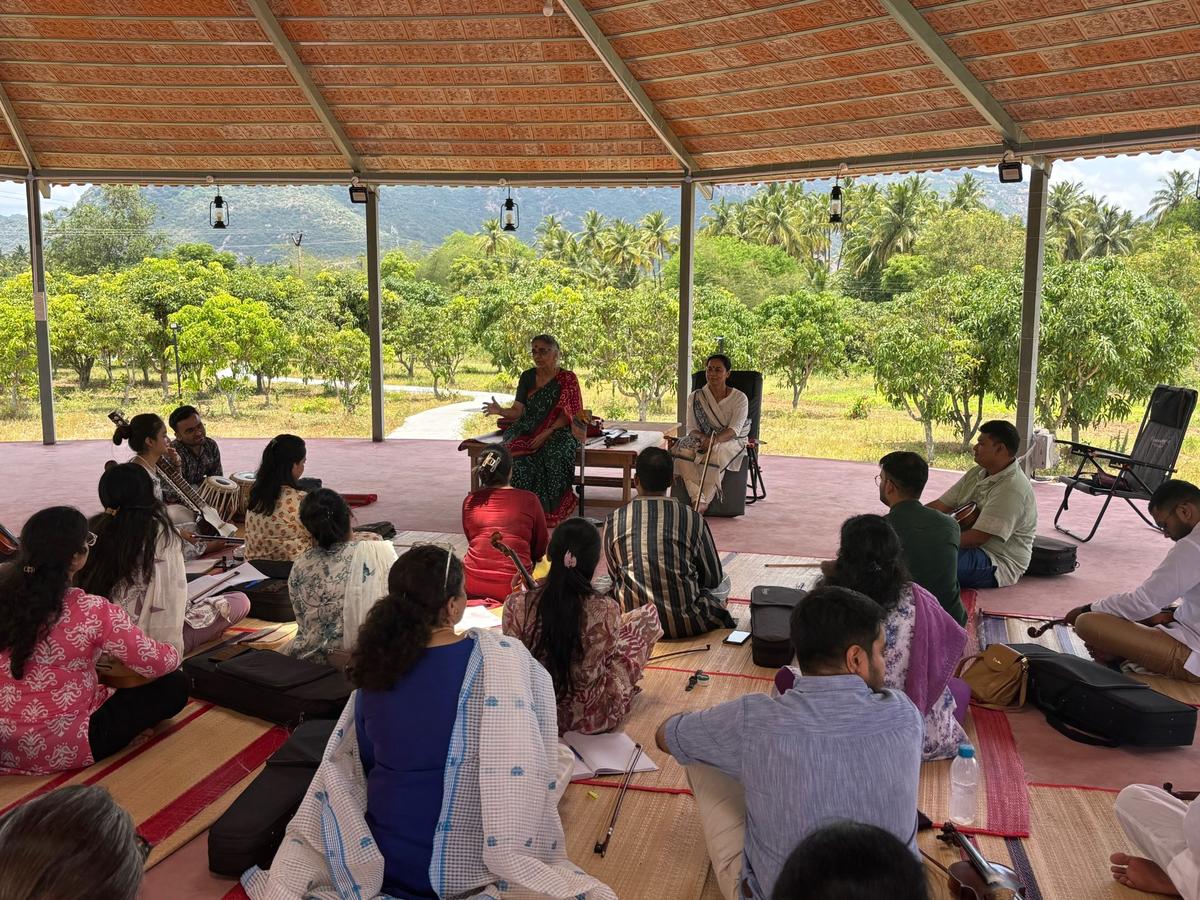
In addition to regular activities, Swar Sadhana Tapovan Gurukul also hosts occasional workshops and retreats.
| Photo Credit:
Special Arrangement
N. Rajam, an Emeritus Professor and former Dean at Banaras Hindu University (BHU), has been performing Hindustani violin concerts for eight decades now and has dedicated over 40 years to teaching music. Her pioneering violin techniques and deep scholarship have earned her many awards including the Padma Bhushan and Sangeet Natak Akademi Fellowship. Her daughter Sangeeta, who holds a Ph. D. in Music from BHU, is a recipient of the SNA award. Together, they represent a lineage of musicians who have made significant contributions to both performance and pedagogy.
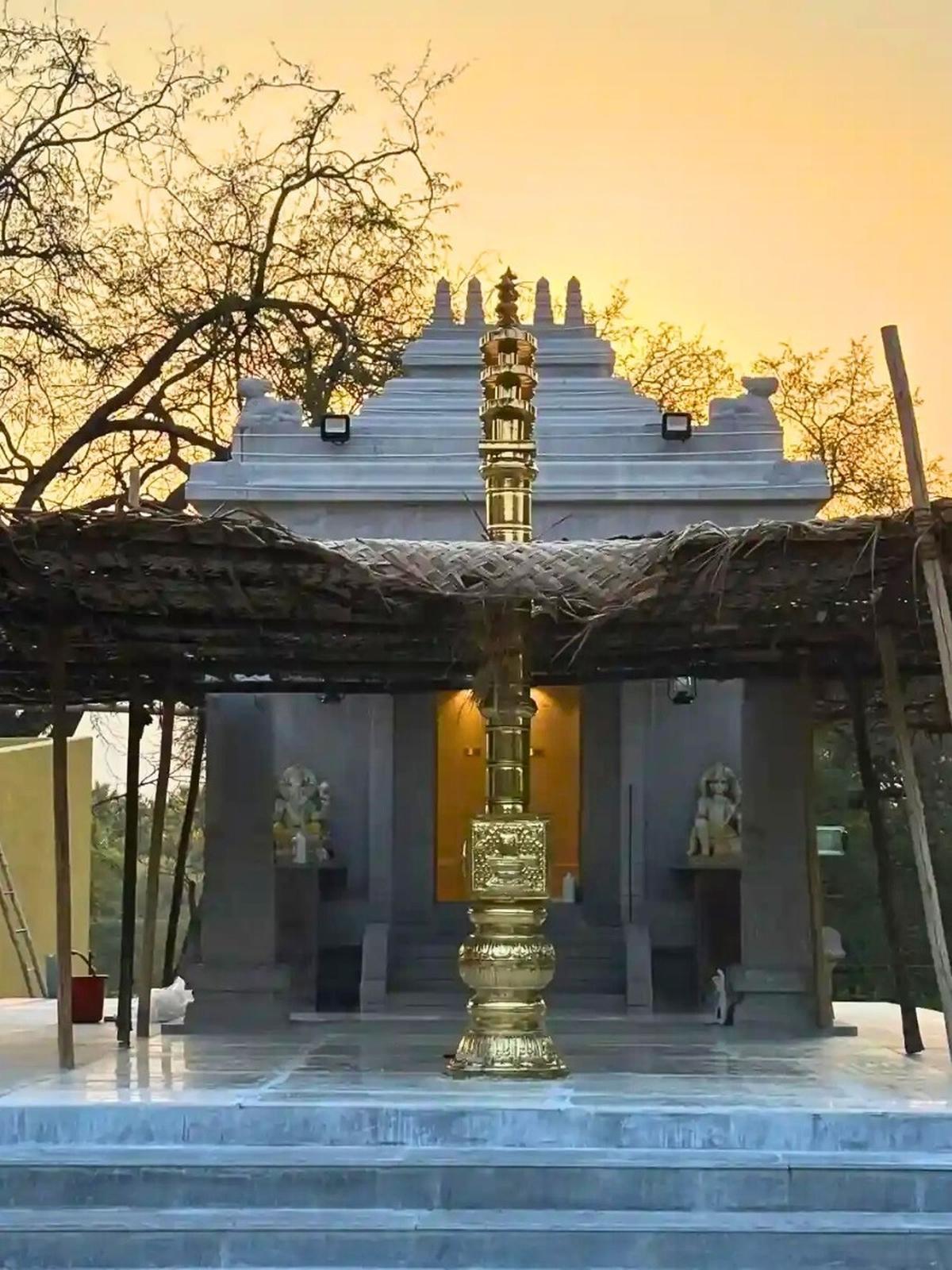
The Neelakanteswarar temple inside the Tapovan.
| Photo Credit:
Special Arrangement
Their shared vision for Swar Sadhana Tapovan was to create an intimate space for learning music and imbibing aesthetic values.
In the lap of Nature
The gurukul’s architecture draws inspiration from the desert camps of Jaisalmer in Rajasthan. There are 12 spacious tents, each named after a raga, desgined to accommodate two students. Each tent is equipped with cupboards, netted windows and modern amenities. A 60-ft circular mandapam functions as an open-air classroom, where lessons take place in a verdant setting dotted with mango trees and a culturally curated herbal garden. The campus also has a temple dedicated to Neelakanteswara, which was consecrated in April this year. “Its centrepiece is a shivalinga in sapphire. This is a place where music and devotion meet,” adds Sangeeta.
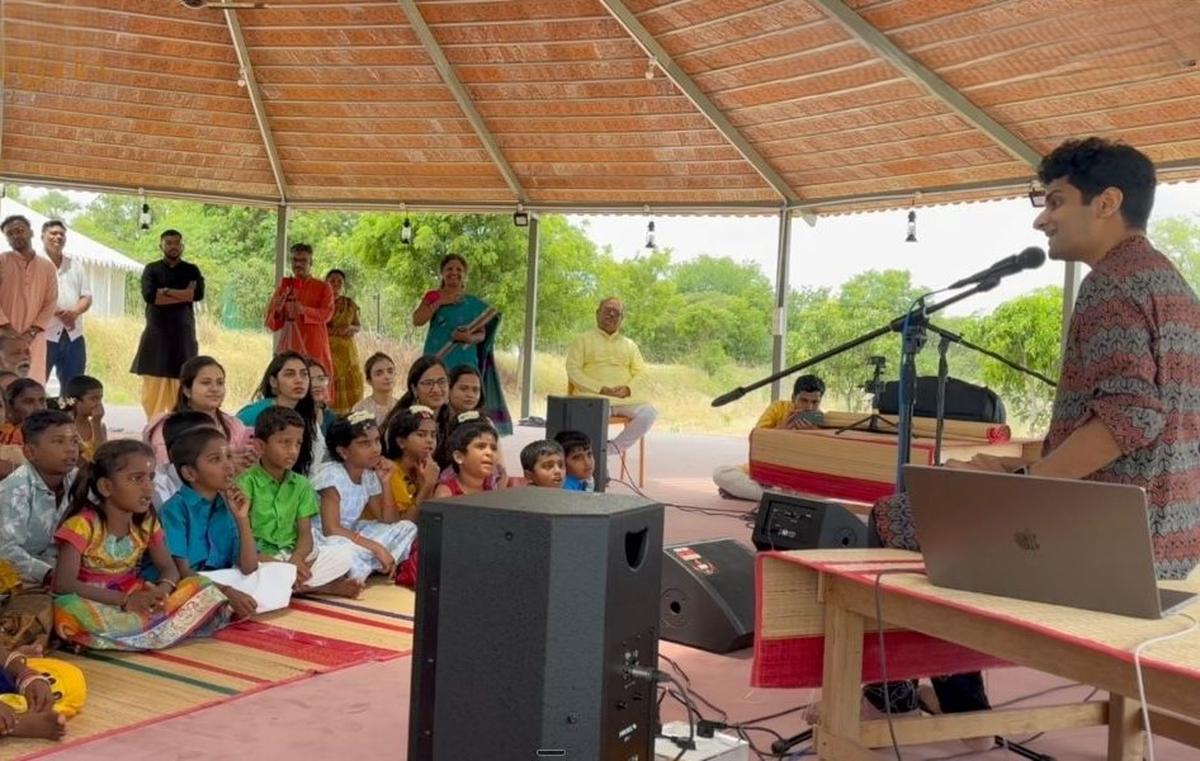
Mahesh Raghvan’s interactive session as part of the Guru Purnima celebrations held at the Swar Sadhana Tapovan.
| Photo Credit:
Courtesy: sharangadev.com
One of the most poignant moments in the gurukul’s journey was this year’s Guru Purnima celebrations. “More than 50 children from Samanur and neighbouring villages attend the event,” says Sangeeta. The event featured a performance by three generations of violinists — N. Rajam along with daughter Sangeeta and granddaughters Ragini and Nandini. There were also interactive sessions with Carnatic musicians Mahesh Raghvan and Akshay Anantapadmanabhan. Many children, who had never seen a violin or a tabla up close or had limited exposure to classical music, listened in rapt attention and joined in the singing too. The event highlighted the potential of community-based music education and the role of informal spaces in fostering cultural exchange.
Sunday classes for children
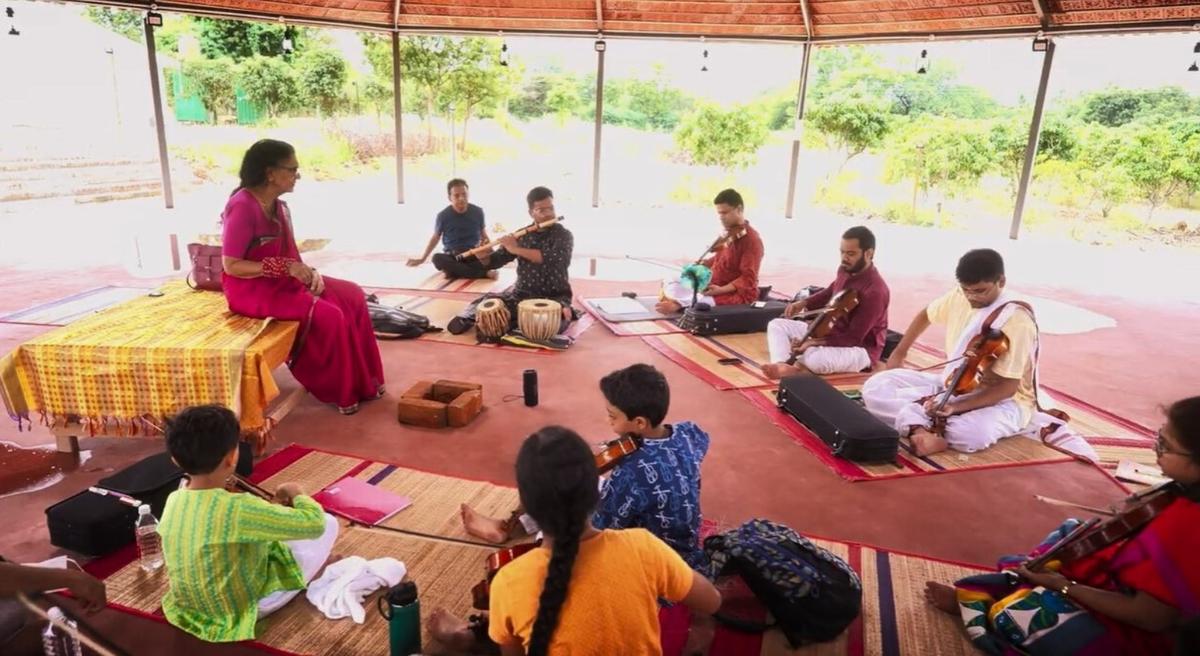
A violin session being conducted by N. Rajam at the gurukul.
| Photo Credit:
Special Arrangement
Every Sunday, the gurukul hosts music classes for children from Samanur, who often come attired in traditional wear — boys in veshti and shirt, while girls in paavadai-chattai. Classes are conducted by R.K. Govindarajan, former director of Vividh Bharati, All India Radio and Doordarshan Kendra, Bengaluru. He is a trained musician and son of Srirangam R. Kannan, who was a professor of music at BHU.
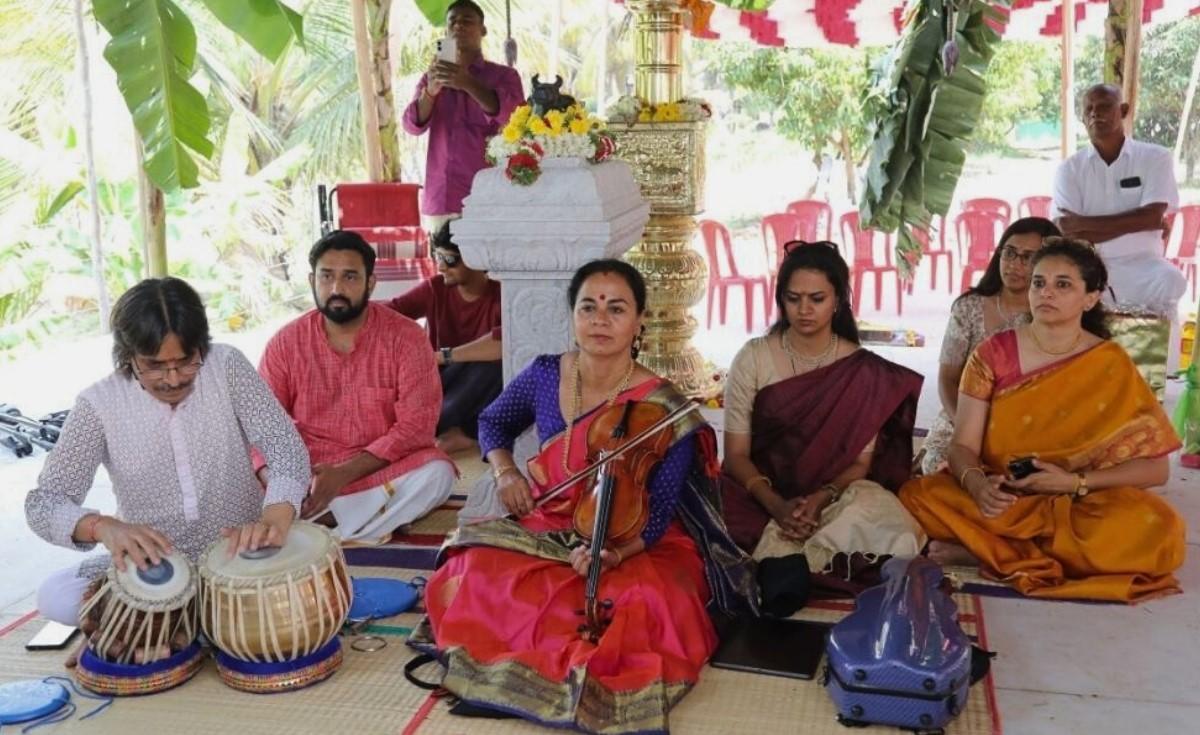
Sangeeta Shankar performing at Swar Sadhana Tapovan
| Photo Credit:
Special Arrangement
Govindarajan, who is enthusiastic about teaching children, stays in a tent too. “The learning doesn’t stop with music, children enjoy listening to stories too,” he says.
“We are identifying talents among them. But even those who might not pursue music professionally will become thoughtful listeners,” says Sangeeta.
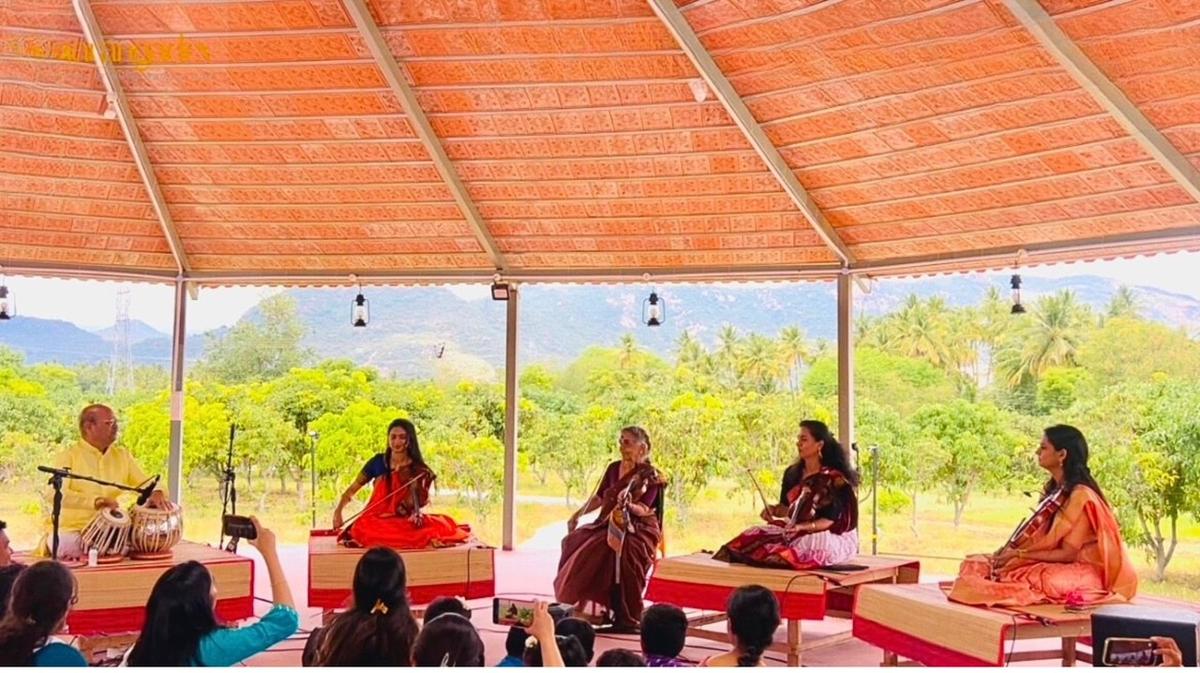
N. Rajam along with her daughter Sangeeta Shankar and her granddaughters Ragini and Nandini performing on Guru Purnima
| Photo Credit:
Special Arrangement
In addition to regular activities, the gurukul also hosts workshops and retreats. In December, they plan to bring together learners from diverse backgrounds. While education remains free, participants contribute towards accommodation and meals.
“The gurukul will evolve as a space where cultural education intersects with community engagement making learning more meaningful,” says Sangeeta
Published – October 29, 2025 08:05 pm IST

